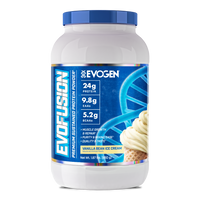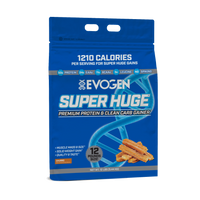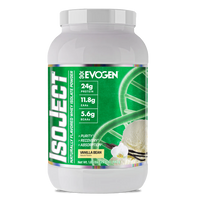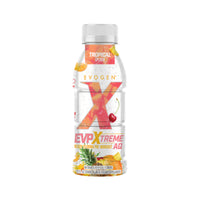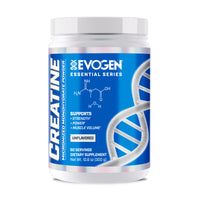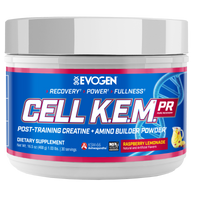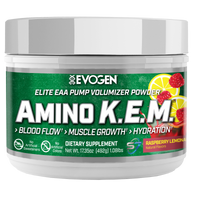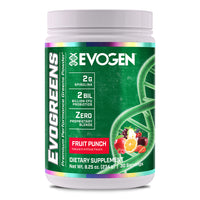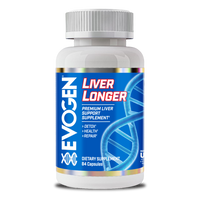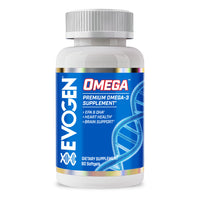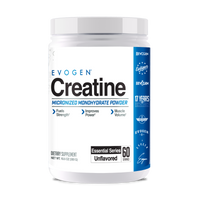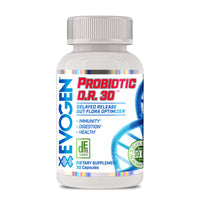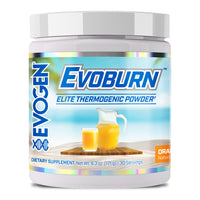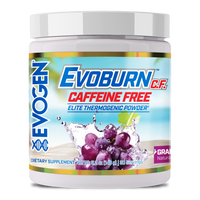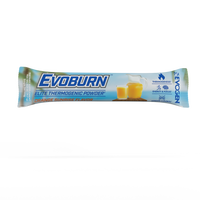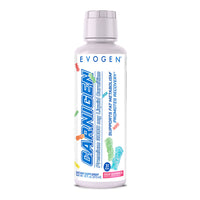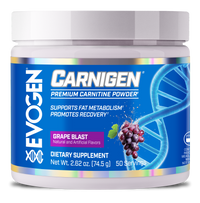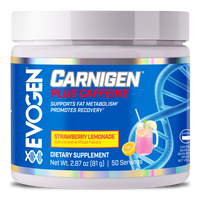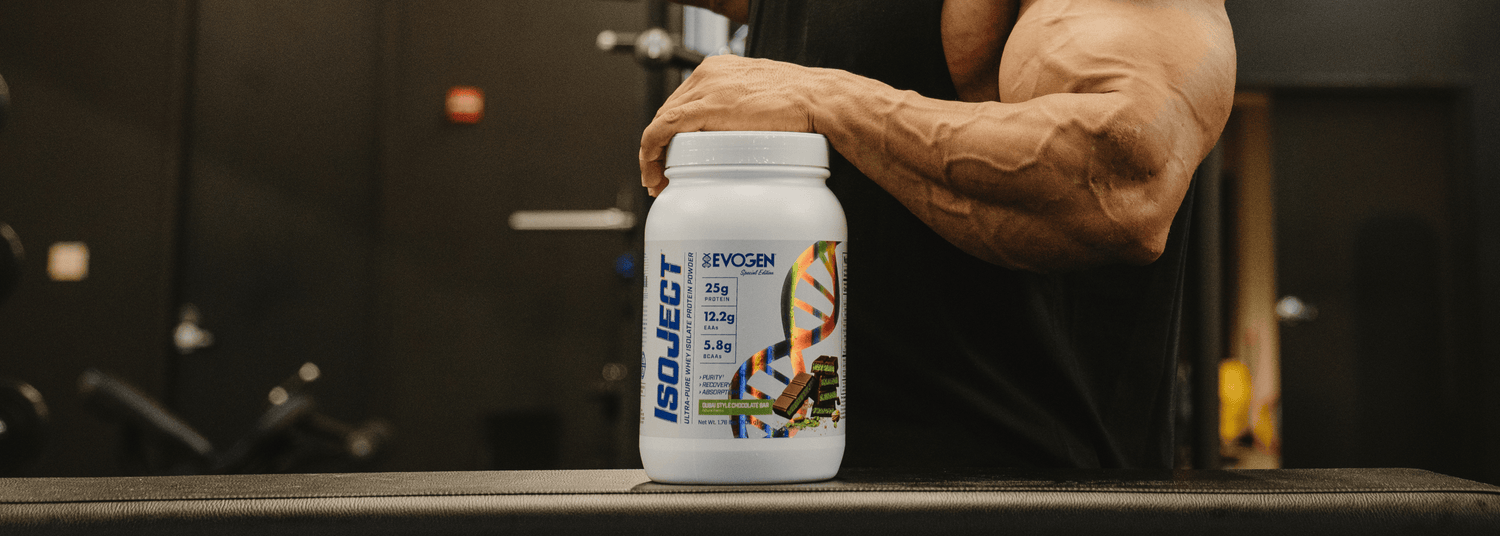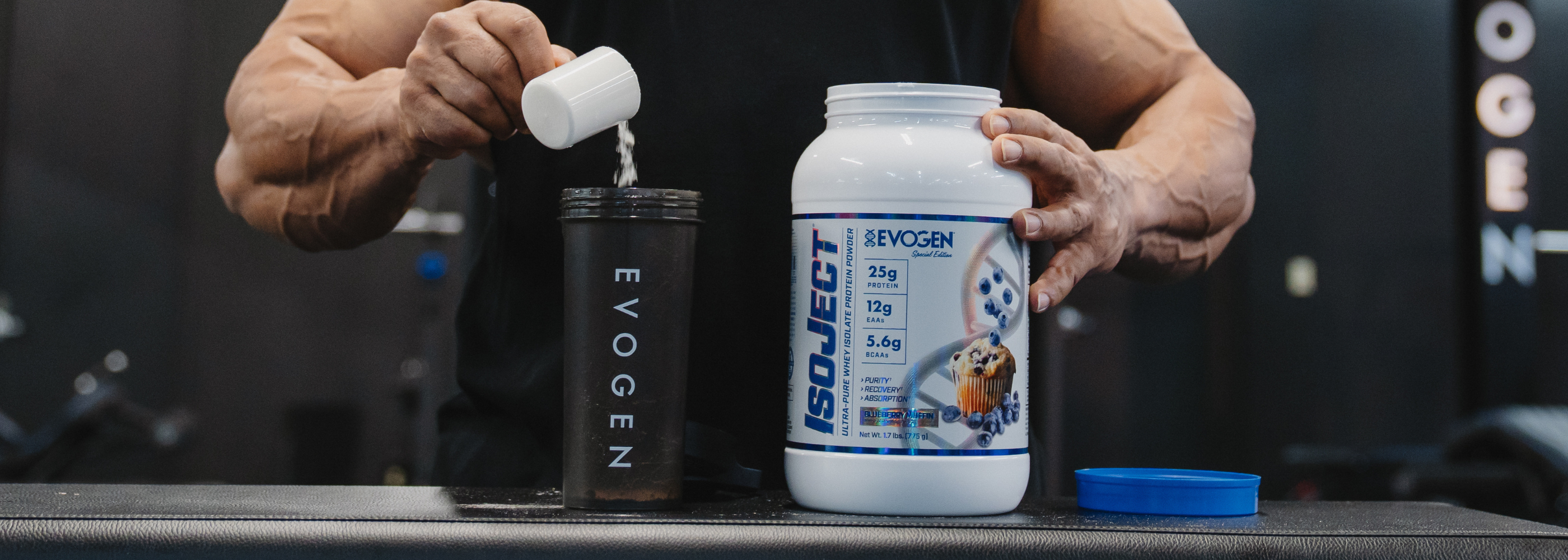If you’ve been training for a while, you’ve probably asked yourself: How much protein do I really need to build muscle? The good news: it’s not guesswork. It’s science and discipline.
Research shows that healthy adults who consume between 0.8 and 1.2 grams of dietary protein per pound of body weight each day can build lean muscle mass, support recovery, and reduce muscle breakdown, especially when combined with resistance exercise and proper rest.
Protein fuels muscle protein synthesis, helping your body rebuild stronger fibers after every lift. But here’s the deal: too little protein slows progress, and too much doesn’t make you gain faster; it just adds extra calories. The goal is balance. Find your sweet spot based on your training intensity, lean body composition, and health goals.
At Evogen, we get that you’re not chasing average results. You’re chasing progress, and the right protein intake can make or break it.
Why Protein Matters for Muscle Growth
Protein is the foundation of every athlete’s physique. Every rep you complete, every set you grind through, you’re breaking down muscle fibers that need amino acids to repair and rebuild stronger. That’s how muscle growth happens.
But enough protein isn’t just about muscle. It also supports hormones, enzymes, and your body’s recovery process. Paired with proper nutrition, especially carbohydrates to refuel glycogen, protein gives your body what it needs to power through strength training and come back stronger.
Think of it this way: your training builds the demand; your nutrition meets it. Together, they drive progress.
Essential Amino Acids and Complete Proteins
When it comes to muscle building, not all proteins are created equal. “Complete proteins” contain all nine essential amino acids your body can’t produce on its own, and those amino acids are what trigger muscle protein synthesis.
Animal sources like chicken, beef, eggs, and dairy are naturally complete. For plant-based athletes, pairing foods like rice and beans, quinoa and soy, or hummus with pita can create the same complete amino acid profile.
You don’t have to eat meat to build muscle; you just need to get all the amino acids your muscles crave to repair and recover.
Timing and Distribution
You’ve probably heard that total daily protein intake matters most, and that’s true. But here’s something athletes often overlook: timing and distribution can make just as big a difference.
Instead of packing all your protein into one or two large meals, spread it out evenly every 3–4 hours. This steady flow of amino acids keeps muscle protein synthesis active throughout the day while reducing muscle protein breakdown between meals.
Each meal is another opportunity to feed your muscles, repair faster, and stay anabolic around the clock.
How to Calculate Protein Needs
Your ideal protein intake depends on your body weight, training load, and lean body mass. There’s no “one-size-fits-all,” but there’s a formula that gets you close.
Using Body Weight
For most lifters:
- Multiply your body weight (in pounds) by 0.8–1.2.
- Example: A 180-pound athlete should aim for 145–215 grams of protein per day.
If your body fat percentage is above 20% (men) or 30% (women), calculate based on lean mass instead; it gives a more accurate target.
Training Intensity and Lifestyle
The harder you train, the more protein your body demands. If you’re lifting weights five or six days a week or performing high-volume resistance exercise, aim toward the higher end of that range.
Tracking helps, too. Use apps like Cronometer or MacroFactor to log meals and ensure you’re hitting your targets.
After tough sessions, fast-absorbing protein makes a big difference. That’s where our IsoJect whey protein isolate steps in, delivering 25 grams of clean protein designed for rapid absorption and muscle recovery.
Best Protein Sources for Muscle Gain
Muscle building starts with the right foods. Whether you prefer animal or plant-based protein sources, the key is variety and quality.
Animal and Dairy Proteins
- Chicken breast: 25g per 4 oz serving
- Lean beef: 24–26g per 4 oz serving, plus iron and creatine
- Fish (salmon, tuna): high in omega-3s to reduce inflammation
- Eggs: 6g each with complete amino acids and healthy fats
- Greek yogurt: 15–20g per serving, ideal for breakfast or snacks
These high-protein foods pack nutrients your body needs for muscle gain, recovery, and better performance. For a boost between meals, use protein bars or whey protein shakes, especially post-workout when your body’s primed for recovery.
Plant-Based Complete Proteins
If you’re training on a plant-based diet, mix and match to hit your amino acid needs:
- Quinoa: 8g of complete protein per cup
- Soy products: rich in all essential amino acids
- Hemp & chia seeds: perfect smoothie additions for extra protein and healthy fats
It’s not about eating more; it’s about eating smarter. Combine your sources and fuel muscle repair naturally.
Protein Timing and Meal Distribution
When you eat, protein matters just as much as how much you eat, especially if your goal is steady muscle growth.
Morning Protein
After an overnight fast, your body’s ready to absorb nutrients. Start your day with 25–30 grams of protein by trying eggs, Greek yogurt, or a shake made with IsoJect whey protein isolate jump-starts muscle protein synthesis and stabilizes energy early.
Pre- and Post-Workout Protein
Fueling before and after workouts helps reduce muscle protein breakdown and accelerates recovery.
- Pre-workout: a light meal or shake with whey protein or amino acids
- Post-workout: within 30–60 minutes, a fast-digesting protein for maximum repair
Our Amino K.E.M. and Evofusion blends are athlete-tested options that support hydration, recovery, and muscle repair, exactly what your body needs after intense training.
Evening Protein
Before bed, choose slow-digesting options like casein or cottage cheese. They keep amino acid levels steady through the night, helping your body rebuild while you sleep, a small habit that delivers massive results over time.
Daily Protein Targets by Goal
Your daily protein intake isn’t static; it changes with your training phase, recovery goals, and even your calorie targets. Whether you’re focused on gaining size, cutting fat, or maintaining, here’s how to fine-tune your intake for results that actually show up in the mirror and the gym.
For Building Muscle
If your goal is muscle growth, aim for 1.0–1.2 grams of protein per pound of body weight. Combine this higher protein intake with progressive overload training, heavier lifts, consistent reps, and structured recovery days.
This combo helps convert every rep into real lean mass. And by pairing your high-protein diet with complex carbohydrates and healthy fats, you’re giving your body the energy and hormonal balance it needs to perform and recover.
For Weight Loss or Recomposition
When cutting calories, your goal is to lose fat, not muscle, and that’s where enough protein matters most. During a deficit, keep your daily protein intake high. For example, 1.0–1.2 grams per pound of body weight preserves lean muscle mass, maintains metabolism, and reduces cravings.
A higher protein intake keeps you fuller longer and prevents muscle breakdown as your body burns stored fat.
For Maintenance
Once you’ve built your desired muscle mass, maintaining it takes consistency. Stick to 0.8–1.0 grams of protein per pound of body weight, distributed evenly across regular meals.
You don’t need extremes; you just need to stay steady. Keep training, eating balanced, and adjusting your intake if your activity level changes.
How Training and Recovery Impact Protein Needs
Your protein needs rise with your training volume and recovery demands. Intense strength training increases muscle protein breakdown, which means your body needs more dietary protein to rebuild and adapt.
If you’re training five to six days a week, or stacking multiple sessions a day, stay near the higher end of that 1.2g per pound range.
Don’t overlook hydration either. Dehydration can slow nutrient transport and recovery. Pair your protein shakes with electrolyte-rich fluids. Our Amino K.E.M. was built exactly for that, keeping you hydrated while supplying amino acids for repair.
And remember: protein works best when balanced with carbohydrates for energy and healthy fats for hormone function. Together, these macronutrients create the ideal environment for muscle growth, weight management, and long-term performance.
Common Myths About Protein Intake
Even with all the research, myths about protein still make their rounds in the gym. Let’s break down what science actually says.
Myth 1: The Body Can Only Absorb 30g at a Time
Research shows that while 20–40 grams of protein per meal maximizes muscle protein synthesis, your body still uses the rest for energy, enzymes, and cellular repair. It’s not “wasted.”
Myth 2: High Protein Hurts the Kidneys
If you’re a healthy adult, you can relax; a high-protein diet doesn’t damage kidneys. Studies show that even up to 1.5 grams per pound of body weight is safe with adequate hydration. The concern applies only to those with existing kidney disease.
Myth 3: You Can Build Muscle Without Protein
You can’t build muscle out of thin air; your body needs amino acids to repair and grow. You can train hard, but without enough protein, progress stalls. The good news: you can meet your needs entirely through whole foods if you plan well.
Myth 4: Too Much Protein Turns to Fat
It’s not too much protein that causes fat gain; it’s too many calories overall. Protein actually has a higher thermic effect, meaning your body burns more calories digesting it compared to carbs or fat.
Your Next Step Toward Stronger Results
Building muscle isn’t luck; it’s strategy. It’s about getting the details right day after day: hitting your protein goals, staying consistent in your training, and recovering smart.
Start by calculating your target range based on your body weight and training intensity. Then stock your kitchen with the right protein sources, lean meats, Greek yogurt, eggs, and whey protein isolate.
Whether your goal is to build muscle, lose weight, or simply feel stronger, consistency beats perfection. Track, adjust, and give your body what it needs to grow.
When you’re ready to elevate your training, fuel it the Evogen way.
Products like IsoJect, Evofusion, and Amino K.E.M. are designed for athletes who refuse to settle, helping you recover faster, train harder, and perform at your best every single session.

